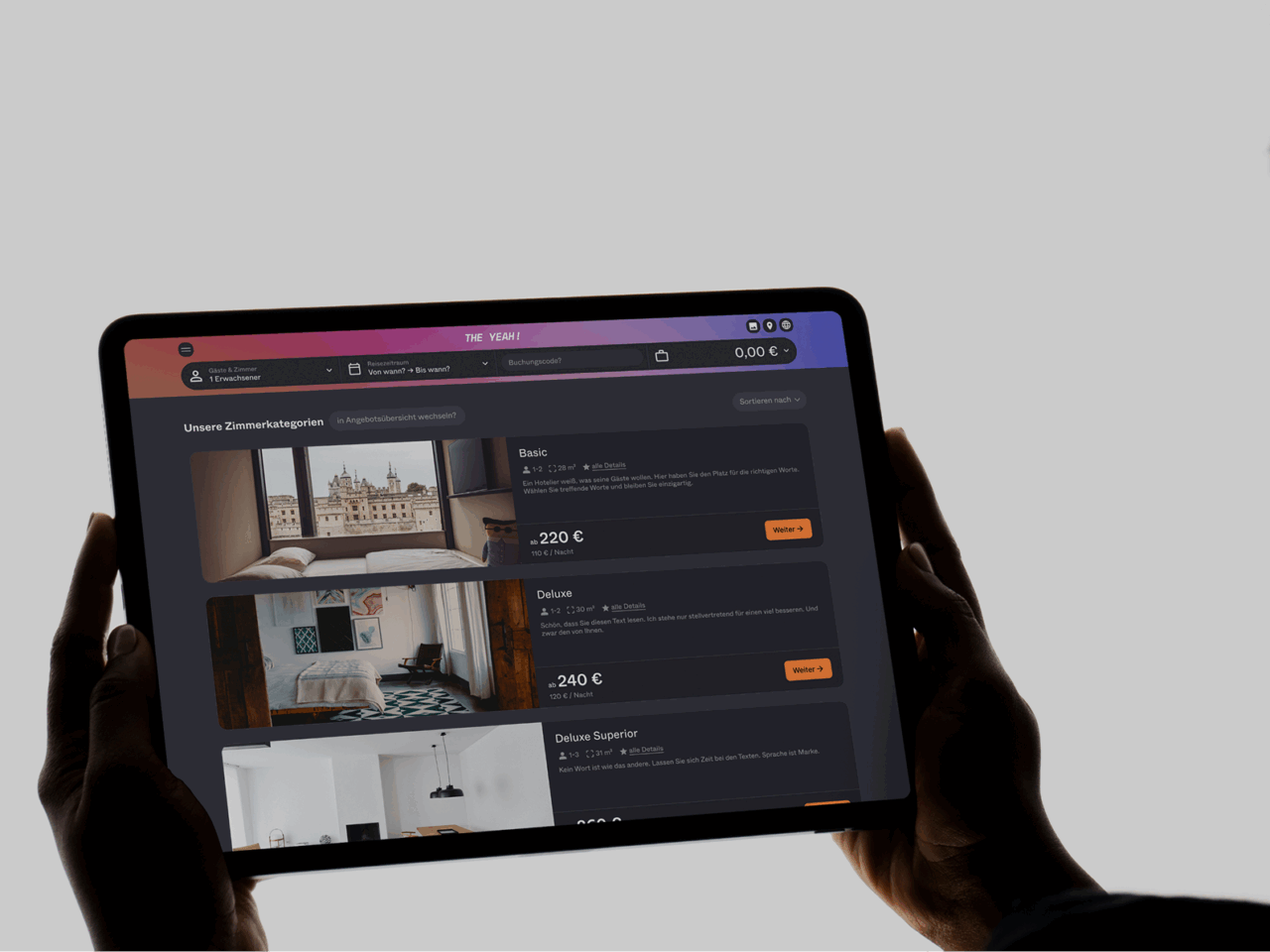What you need to consider when selling your hotel rooms through a meta-searcher?
In principle, a meta-searcher is nothing more than a search engine. Probably the best-known comparison portals are Google, Trivago or TripAdvisor. If one searches for a hotel room via one of these providers, the booker is shown several booking options per hotel via different portals (and the hotel website). Ideally, the decision is made for the most favorable booking channel – your website.
Even if you don’t work directly with one of these meta-searchers, your hotel may be listed on the appropriate platforms. This is because the online booking portals like Booking.com usually place their offers on these sites. The advantage for bookers is obvious: they can quickly and clearly find out about the various offers from different hotels. You can see pictures, prices and ratings at a glance. However, the booking does not necessarily take place on the meta-platforms page. In most cases, the comparison portals merely assume an intermediary function by forwarding the user to their own website or an online booking portal.

Example view Google Hotel Ads Parkhotel Landau
That’s actually quite attractive, isn’t it? What is there to consider?
Of course, meta-searchers do not offer their mediation services for free. In some cases, you can choose between these two pricing models (bidding strategies):
Cost per Click (CPC): If you opt for the CPC model, a fee is charged whenever a potential customer clicks on your hotel ad and is redirected to your booking screen – regardless of whether a booking is ultimately made or not.
Cost per Action (CPA): Assuming a prospective customer clicks on your hotel ad and is redirected to your booking screen, no fees are incurred yet. It only becomes chargeable when the guest actually books. As a rule, you then pay about 12% commission to Google, Trivago and Co.
Ok, so I’ll go with the CPA model to minimize the risk as much as possible, right?
At this point, it all depends on how much effort you want to and can put into maintaining the meta-search connection. Basically you can say: If you want to work with the CPA method, you might as well leave the field to Booking.com & Co. To these providers you also usually pay around 12% commission per booking and via these portals your hotel may be listed with the corresponding meta providers anyway. So it doesn’t really make much difference to you whether you pay the 12% per booking to Booking.com or to Trivago. You then save yourself the maintenance of another portal, but should also note that you make yourself more dependent on the large online booking portals such as Expedia and Co.
The opportunity in working directly with meta-searchers is to generate more bookings that cost you less than the usual 12% commission. So the more users book, the higher your conversion. And once they are familiar with your booking engine, they might book directly via your website next time … 😉
Conversion, click fees, cost per order… I don’t understand it all!
Do not panic! Let’s look at it in detail using an example with the Google Hotel Ads meta-platform and the CPC model. Let’s assume that in May of this year 1,623 users clicked on your Google hotel ad. 54 bookings resulted from these clicks and you generated a turnover of 11.398,00 € this way:
You had previously offered €0.30 fee per click. This variable is the maximum CPC. So you would not have paid more than this amount per click. However, this is not the actual CPC you used to participate in the auction for the best ranking position. This was calculated by Google from three different variables: Your bid (0.30 €), the Quality Score of your ad (i.e. how well your ad performs) and the bid of the next lowest competitor (in this case Booking and Co.). With this actual CPC you then entered the auction for the best ranking. Let’s assume that the actual CPC was €0.10. Thus, you had to pay 162.30 € click costs to Google (1,623 clicks x 0.10 € = 162.30 €).
In the next step, we will check how many bookings you have received via Google Hotel Ads in May 2023. Let’s assume you received 54 bookings during the period under review. First, we calculate the conversion achieved:
(100% x 54 bookings) / (1,623 clicks)
= 3.33 % Conversion
So now you have received 54 bookings and generated revenue of €11,398.00. How many euros did you take in per booking?
11.398,00 € / 54 bookings = 211,07 € revenue per booking you have achieved.
In total, you have spent €162.30 for all bookings. Let’s look at how high the cost per booking was, i.e. the cost per order (CPO):
162,30 € / 54 bookings = 3,01 € per booking you had to pay.
Now you only need to know whether €3.01 (costs) out of €211.07 (revenue) is more or less than 12% to judge whether it was worth the effort:
(100% x €3.01 cost per booking) / (€211.07 revenue per booking) = 1.43% cost per booking (Cost of Sale [COS])
In fact, you don’t necessarily have to break down the calculations to the amount per booking. You can also calculate how high the total cost share of the total turnover was: (100 % x 162,30 € total costs) / ( 11.398,00 € total turnover (via Google)) = 1,42 % cost per booking
Well, that was worth it!
In this case, the hotel has had to pay much less than 12% per booking. Google was thus a thoroughly attractive partner for our test hotel in May 2023.
My tip: Unless you work with evaluation tools that provide you with these values automatically, you can create an Excel overview with little effort. There you just enter the following four values and let Excel calculate for you:
- Number of clicks
- Number of bookings
- Total revenue achieved per MetaSearcher
- Click fees incurred
But what if the COS parameter is above 12%?
Then you need to consider whether it should continue to list its own website on Google Hotel Ads. In addition to a short-term conversion to the CPA model, you have these adjusting screws available in the CPC strategy, among others: Adjustment of the click price, optimization of the general conversion rate of your booking mask or an increase in the shopping cart value.
Maybe you want to try a meta-search connection? Feel free to contact our sales team at sales@hotelnetsolutions.de to initiate a quick connection. Do you have specific questions about your existing meta-search connection? Then our support team is looking forward to your request.
If you would like to read more about meta-searchers, you can access our handout here.
Note: Please note that interface fees are not included in the calculations. In order to calculate the distribution costs quite correctly, you would first have to add them to the click costs incurred and thus include them in the calculation.






